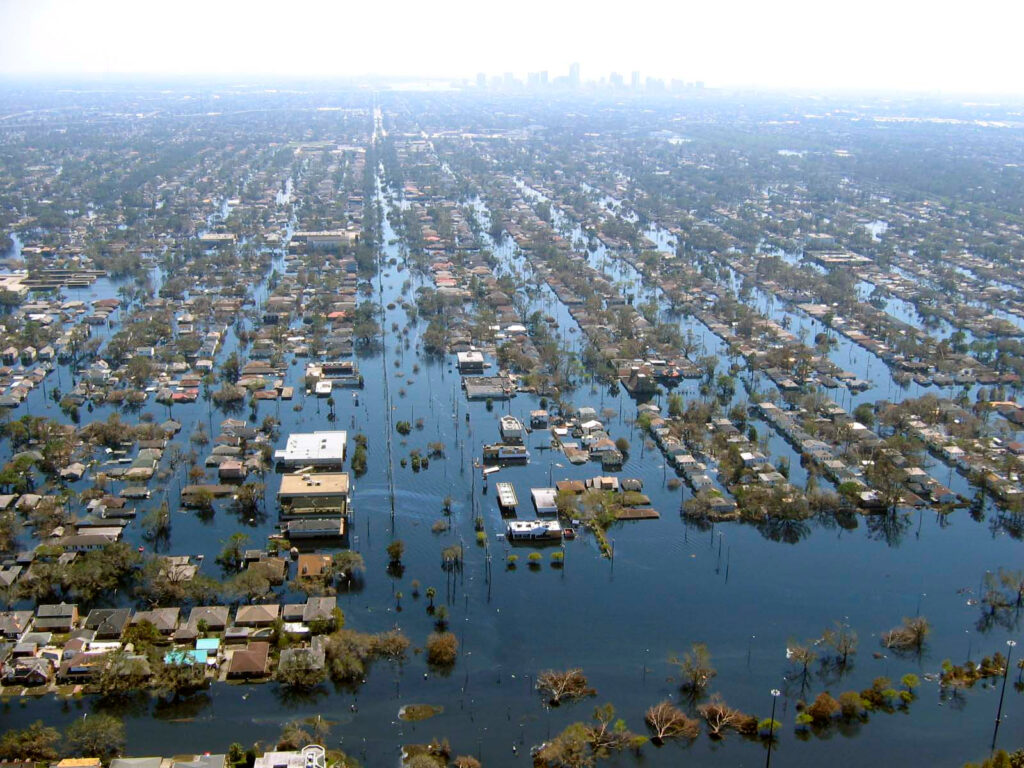By Lauren LaBorde, JMA Communications Specialist
All the recent extreme weather events communities have been experiencing both in the U.S. and internationally has me thinking about Hurricane Katrina, the 17th anniversary of which was on Aug. 23. The date is particularly important to me since I grew up in the New Orleans area, and on the day I was supposed to start my freshman year of college my family and I evacuated and didn’t return for three months. Thankfully we were spared the death and destruction that touched the millions who were left homeless and lost loved ones, but the storm revealed things to me that are very much relevant as the climate crisis worsens. There were many lessons to learn from an event that’s in our recent history, but I’m not sure if we have.
While Hurricane Katrina is often classified as a “natural” disaster, it was really anything but. At the weekly newspaper where I worked after college, when we wrote articles mentioning the storm we always referred to it as “Hurricane Katrina and the federal levee failures.” The storm would not have been as devastating if it weren’t for the failure of the levee system built to protect New Orleans from a storm experts had long been saying was coming. Then there was the subsequent failure of the Bush administration and FEMA, who sent formaldehyde-filled trailers to the mostly Black residents whose homes were destroyed.

The poisoned FEMA trailers are just one of the many ways that Katrina exposed New Orleans’ deep inequities. The residents who disproportionately experienced the storm’s death and displacement and, in general, a complete failure of the systems built to protect people, were New Orleans’ Black residents. Many of them lacked the means to evacuate because of existing disinvestment and ended up dying or being stranded on their rooftops as the levees burst and water climbed to their ceilings.
The inequities laid bare only increased after the storm, when the city used the “recovery” period as an opportunity to privatize essential goods. The public school system, already suffering from disinvestment before the storm, was scrapped in favor of a charter school system that lacks transparency and saw the purging of many veteran Black teachers. Now, New Orleans is the first American city without traditional public schools. The city also tore down its public housing projects—many sturdy, brick homes that had been undamaged in the storm—in favor of mixed-income communities that significantly decreased the city’s public housing stock.
But after all of these changes that displaced thousands of Black residents made in the name of “recovery,” is the city better prepared for another big storm? I would say no. Last August, New Orleans area residents were without power for weeks when the aging power grid of the city’s private energy utility, Entergy, failed during Hurricane Ida. And more recently, Entergy said that residents should prepare to be without power for 21 days in the event of a category 4 storm. And this is in a city that already experiences oppressive heat and humidity during the summer.
The main thing I learned from Katrina is that when systems fail, it’s BIPOC, poor people and other marginalized groups who bear the brunt of this failure. Increasingly, cities outsource essential services to private companies for efficiency, but without these public goods, people suffer.
I’m constantly frustrated by the deprivation of our public goods, but the work we do at Jobs to Move America gives me hope. The Biden administration has made some historic investments in our infrastructure—which is crucial in preventing the kind of failure New Orleans experienced. But while this work to update our infrastructure is important, we need to make sure that investments result in good jobs that can actually sustain families and lift people out of poverty, and that’s what JMA aims to do.
Beyond making sure these investments create good jobs by working to lift the ban on Local Hire and update the OMB’s Uniform Guidance, JMA also works to win Community Benefits Agreements with manufacturers that receive tax incentives from local governments. It’s important that communities have a say in the kind of jobs these companies provide when it’s our tax dollars that go toward creating them. In Louisiana, many of the oil and gas companies that pay the best salaries for people without college degrees are ironically the ones destroying the state’s coastline and contributing to global warming. These huge, multinational corporations that provide well-paying jobs to people who need them must not leave communities worse than they found them, and CBAs can make sure of that.
Recovery and resilience efforts should present an opportunity to not only mitigate the worst effects of climate change, but also heal the longstanding inequities that have plagued us for too long. Unfortunately, there will be many more Katrinas to come as the climate crisis continues to get worse. Making sure public goods do the most good and that jobs in the green energy sector are high-quality will help us avoid the mistakes that we saw during and after one of the worst disasters in the U.S.
